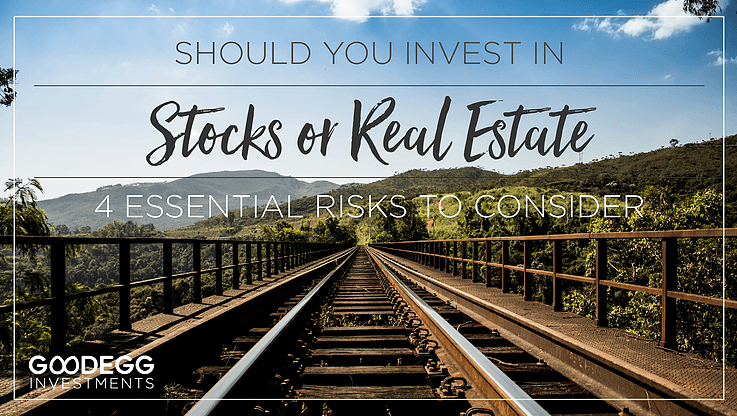Let’s talk about risk.
That’s right, I said it. Risk. The thing that’s at the forefront of everyone’s mind when they think about investing. It’s typically sandwiched between the image of Warren Buffett and that fancy car, house, or resort vacation you’ve filed under your “someday” bucket.
Investing in real estate can often seem particularly risky. After all, everyone knows what happened during the Great Recession, and media outlets are always tossing around terms like “housing crisis” and “real estate bubble.”
What if I invest in real estate and lose money, you wonder. What if I get caught up in a scam and get taken advantage of. It’s probably safer just to leave my money in my savings account. At least there, I can “see” my money.
Well, you’re not alone. Over 60 percent of Americans find investing to be scary or intimidating, according to an independent market survey.
But, on the flip side, 60 percent also recognize that “someday” they will need to be more financially secure than they are now.
Seems to me that more than a few people are putting off to tomorrow what they should be doing (or investing) today.
For the next several minutes, I challenge you. I challenge you to set aside any preconceived notions you may have about real estate investing.
Let’s take an honest look at the risks when investing in stocks versus investing in real estate, how multifamily real estate investments in particular (i.e., apartment buildings) mitigate risk, and why investing in the stock market can be much riskier than real estate.
A Primer on Risk
First, I have to state the obvious. In any investment, there’s an element of risk. Just as when you walked out the door this morning, there was a small chance you could have gotten hit by a bus, unexpected things come up with investments as well, whether in the stock market or in real estate.
The key is not to look for investments that are risk-free, for if you do that, you will be sitting on the sidelines forever.
Rather, the key is to understand the risks, how different asset classes mitigate risk, and go in with your eyes wide open.
With that, let’s take a look at four essential risks of investing, and how the stock market and multifamily real estate investments each address these risks.
Risk #1 – Consumer Behavior Could Change
Stock Market
When you invest in the stock market, you’re investing in products that people use. Products like Facebook, iPhones, McDonald’s Happy Meals, and Dial Soap. These are all products that people use, at least for now. But who’s to say what the future holds for these products?
Remember Blockbuster? They were doing great for a long streak there. People loved perusing their shelves on Friday afternoons, taking home a few blue VHS boxes for the weekend. But when technology and consumer behavior changed, the company stagnated, dragging investors down with it.
Multifamily Real Estate Investments
When you invest in real estate, you’re investing in a basic human need that will never go away: the need for shelter. As long as humans have been around, we’ve had a need to have a roof over our heads, and that need has only grown stronger over time, especially as the population has risen and cities have become denser.
Risk #2 – The Market Could Turn
Stock Market
This is perhaps one of the most common fears, and one of the biggest reasons would-be investors are sitting on the sidelines. When you invest in the stock market, you have to be prepared for market corrections, and they could happen suddenly and without warning.
What do you do when a correction happens? You either try to time the market and get out before you lose too much money (which is infamously difficult and next to impossible).
Alternatively, when you invest for the long-term, you have to hold steady and be prepared to lose money in the short run and trust that the stock market will bounce back, as it has done historically.
But of course, it’s never fun to see your money dip down, and it can be exceedingly hard to hold on to that “trust” when the numbers are falling ever day.
Success in the stock market involves a high degree of psychological tenacity, shrewd decision making, and the ability to sit tight, which can be difficult.
Multifamily Real Estate Investments
Believe it or not, a recession could actually be a good thing for multifamily real estate investments. No no, you read that correctly. I’ll say it again.
If a recession hits, apartment buildings actually tend to do better.
This is true especially for workforce housing.
To understand this phenomenon, we have to take a look at consumer behavior. In good times, people are able to make more money and save more money, so they’re more likely to buy a house or rent really nice (class A) apartments.
In not-so-good times, when people get laid off or have to take pay cuts, they tend to also have to downgrade their living situations. Homeowners might become renters, and renters of class A apartments might become renters of more standard or workforce apartments (class B or C).
Hence, during a recession, demand for apartments actually tends to go up, not down, thereby decreasing the risk.
Risk #3 – Competitors Could Come on the Market
Stock Market
Let’s go back to the Blockbuster example. They’re easy to pick on, and I still have a certain level of nostalgia for those bulky VHS boxes.
When Netflix came on the market, they targeted roughly the same audience that Blockbuster did – people who wanted to watch movies at home. However, Netflix was able to get ahead of the changing technology and was able to better meet consumer needs.
Of course, if you had the foresight to invest in Netflix when it was a fledgling company still mailing DVDs, you would have made out famously and would probably be lounging around on a beach somewhere, rather than reading this article.
The problem is, that as mere consumers, most of us don’t have deep insights into where technology is headed or clear insights into how these companies operate and where they’re headed. Thus, when competitors come online, they can have a significant impact on these companies, and on our investment returns.
Multifamily Real Estate Investments
Multifamily competitors, on the other hand, very rarely spring up out of nowhere. Because space is limited, there can only be so many apartment buildings in a given area, and building new apartments takes time (permits, development plans, construction crews, and more).
These days, because of rising construction costs, when new apartments are built, they’re almost always class A (i.e. luxury tier) apartment buildings. It’s just not worth developers’ time and energy to spend all that money on construction to get class C rents.
However, demand for workforce housing is not going away anytime soon. In fact, it’s on the rise. Because of that, the risk of having lots of empty apartment units, especially in well-maintained class B and C apartment buildings, is fairly low.
Risk #4 – Not Having Control and Transparency
Stock Market
When you invest in stocks, it’s sort of like you’re buying a train ticket. The train is going to go where it’s going to go, with or without you. You just have to decide whether you want to go along for the ride.
If you’re dissatisfied with your returns, why, you could just look up the CEO’s number and call him/her directly, right? Oh wait, I switched into fantasy writing mode for a second there.
Of course, we all know that when stock values drop, there’s nothing we can do. Well, it was my fault for investing in that stock, you might think to yourself. And that’s a terrible, helpless feeling.
Multifamily Real Estate Investments
When you invest in apartment buildings, you actually can call up the deal sponsor, and they often love to hear from you. In fact, I’ve personally provided feedback and ideas that deal sponsors have implemented in their apartment buildings, to provide more value for both tenants and investors.
On top of that, good deal sponsors always build in a buffer (aka, reserves) for a rainy day, so they can rely on that pool of money to fix the roof or deal with unexpected plumbing issues. And if a freak storm hits? That’s what insurance is there for.
Further, because real estate is local, you can choose where you want to invest, based on your goals.
Personally, I choose to invest in markets with strong economic diversity and job growth, relatively low cost of living, and low property taxes.
This is all data that I can gather myself and understand fairly easily, unlike the metrics used by companies to measure consumer trends and sales growth.
Conclusion
For me personally, investing in multifamily real estate makes more sense and provides a lower risk investment. I have more control and transparency over my investment, as well as a physical asset that’s more recession-proof than most stocks.
If I wanted to, I could visit the apartments I’ve invested in, meet the tenants, and walk the units. On the flip side, if I called Tesla or Apple to try to walk through their labs, they would laugh me right off the phone.
That being said, there are people who have made millions by investing in real estate, and people who have made millions investing in the stock market.
There’s certainly not one “right” way to invest.
The key is to invest. Period.
Understand the risks going in, and just do it. Because that money that’s sitting in your savings account? The money you can “see” – it’s losing money to inflation with every passing second.
You can get started with our Beginner’s Guide to Real Estate Investing, learn more about financial freedom, or see whether Google stocks or real estate investments would have made you more money over the last 10 years.
Whatever you do, get out there, conquer your fears, and start facing your “someday” today.





